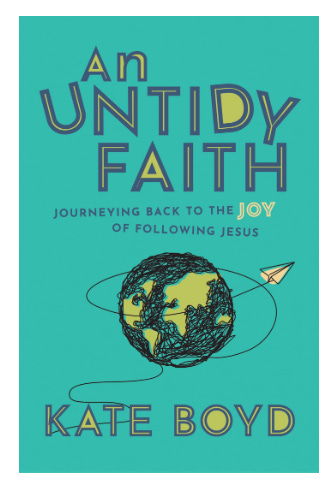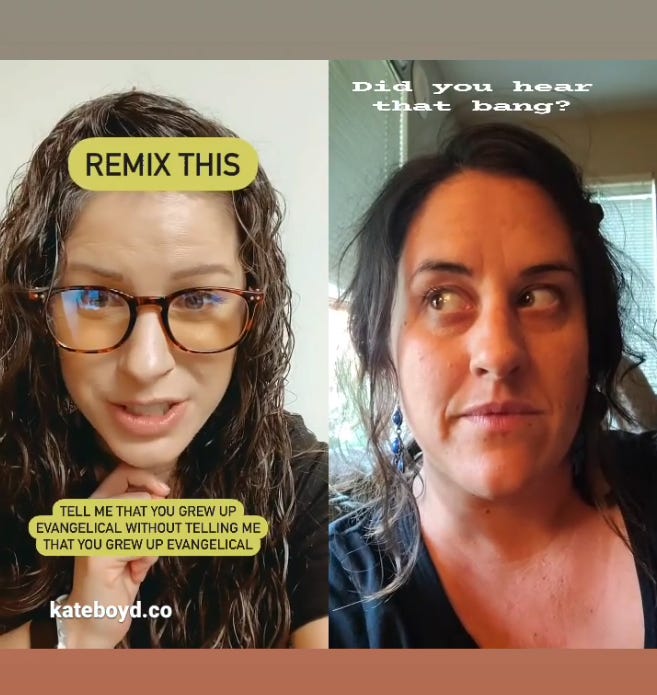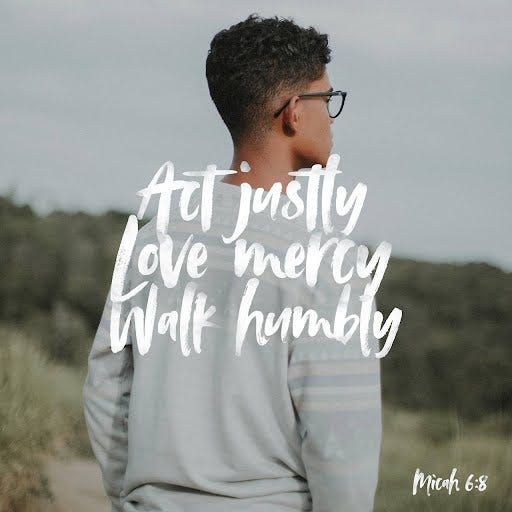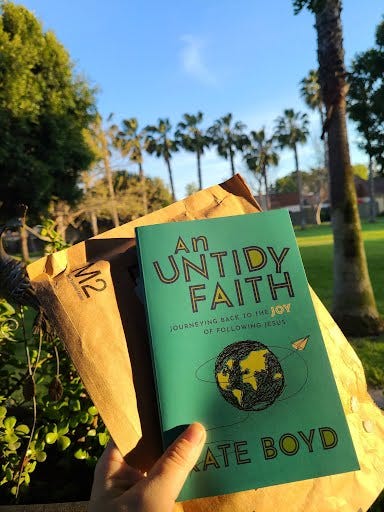Let's Disentangle Our Untidy Faith
The Rapture, deconstruction and a little bit of messy middle following Jesus
I first connected with Kate Boyd over an invitation to remix a reel about being afraid of getting “left behind” during the rapture as a kid. For those of you who aren’t from this background, the rapture is a Christian theological belief in which God beams-up all his believers from the earth before seven horrible years strike the globe, known as the Tribulation. This unpleasant time concludes with Jesus returning and judging the world. The fancy name for this belief is almost as long as its description: dispensational premillennialism.
I usually felt pretty confident in my childhood faith. That is, unless I couldn’t find someone who was supposed to be at home within sixty seconds. Then I’d start panicking, sure I was left behind. The dramatic, bestselling and very entertaining Left Behind book series on this didn’t reduce my fear. Nor did living mere miles from what is now one of six U.S. military’s Space Force sites. Roaring rockets rattled windows, waking me up in the middle of the night drenched in sweat, convinced I missed the rapture and the tribulation’s terrors had begun.
Deconstructing the Buzzword “Deconstruction”
I was probably somewhere in my late teens when I began shifting some of my beliefs, and the rapture was one of the first to go. As I started following Kate Boyd, I discovered her "disentangling" experience was very similar to mine. We were both good girls, checked boxes, and began serving the Church young. Then we deep dived into theology as adults after encountering what following Jesus looked like global cultures.
I related with her idea of disentangling. This is Kate’s best term for the current buzzword, “deconstruction,” now used to describe believers who are trying to work through the faith they grew up. Between a pandemic, surfacing social justice issues, and a certain Republican and his quasi-Jesus touting, nationalistic followers who shook politics with “God and country” rhetoric—things finally got real for Americans. It is no surprise that we began questioning our faith foundations.
Three Paths of Deconstruction
Personally, I think this mass deconstruction is great. I’m just not always a fan of how it goes down. In her new book, Untidy Faith, Kate Boyd reminds us that we can choose our own deconstruction. Here are the three paths she names:
Doubling-down: viewing questions as threats and shutting down alternative ideas
Demolishing: leaving and/or bashing their faith, often because of anger or hurt
Disentangling: Figuring out what you really believe and why
One thing I greatly appreciate in her new book is that she challenges us to “choose our own deconstruction.” We don’t have to shut down our questions with unsatisfactory answers and pretend all is well. Nor do we have to burn the house down as we leave the faith. What we do with our questions is our own choice. However, if we aren’t intentional, it is pretty likely we’ll probably go down one of the first two paths.

About those two paths…
Recently I listened to a very “doubling-down” sermon; I left so disheartened. I mourned, for it was really a funeral for a dead faith. From what I’ve seen, doubling-down leaves us in echo-chambers and we don’t really become the Church we are called to be.
I understand “demolishing.” There are often good reasons people leave—abuse, injustices, or church people just being unsafe to question our faith without being extremely judged. Honestly, it is a miracle when people come back to their faith despite these things. But it isn’t a privilege to heal from deep church hurt. This journey is accessible to all. It might be long, hard, and impossible without God. But I’ve walked it and I’ve seen others who’ve gone through much worse both heal and continue in faith.
However, I’ve discovered I am greatly irked when leaders teach newly deconstructing people from a “demolishing” perspective. It is 100% reactionary and yet these influencers guide droves of former believers, not into healing, but into its own echo-chamber of outrage. I have had to unfollow many deconstructing demolishing leaders through the past few years. Even though they might not mean to be, they are toxic.
Disentangling Outside D.C.
By the time I was studying cultural anthropology, global affairs and other social sciences in college, I was deep into deconstruction without realizing it. It wasn’t just the worldviews and religions. Living in the politically charged D.C. metro area and being among followers of Jesus who were new to the faith—or at least not part of the of evangelism I grew up—were major contributing factors.
I remember finding myself shocked when I realized I was the only one in the group discussion who was even aware of Israel’s continued importance in the coming apocalypse—how did no one else know?! I secretly wished I was a Jew because Jews were just a little more special. Why did I believe that in the first place? I wondered who I could talk to about the God-mandated genocides I saw in the Old Testament. And why would someone passionately follow God, even through they didn’t believe in supernatural gifts?
Then I was confronted with friends leaving when I, a woman, would teach and my husband managed the childcare. Or there was the time I found myself unexpectedly sobbing in Chili’s when my church wrote it into their bylaws that women couldn’t be part of their leadership team. I had a lot of junk to confront as a woman in ministry—here’s what I wrote when I intentionally began disentangling it. What’s funny is that I didn’t even know the half of it then!
Doing Justice
But the greatest changes in my beliefs began as I slowly shifted from just caring about just missions as “evangelism” to the restoration of goodness through justice work. As I found this idea prevalent in the scriptures, I began going against the grain of the way I’d seen modern missions done. How could I bring “good news” of Jesus without tangibly caring for the very people I wanted to reach? It wasn’t like the resources to come alongside people in need were unavailable. Besides, if felt hypocritical to come in with a “better” ideology without actually valuing the people I was trying to “save.”
As seeking justice became the epicenter of my work, I became angry at the glorification of war and how much my country spent on the military—I had a huge “Death and Taxes” poster on my wall in reminder. I pushed my fellow Americans to care about immigration and human trafficking. I was appalled that racial issues were still a thing. Even while working at a crisis pregnancy center, I had a conversation with another young woman representing Planned Parenthood. We both were shocked that we had more in common than we didn’t.
One day a neighbor told me she wasn’t a liberal, like me. I laughed. Me, a liberal? Nah, surely I was a good Republican, like her. I was just a Christian, too!
You see, I didn’t consider my disentangling to have much to do with politics at all—I had very little hope in government and largely ignored it. (I just figured I should leverage it when opportunity arose.) Honestly, I was just trying to figure out who I was while trying to follow Jesus.
Deconstruction is Discipleship
This is what I think many Christians don’t get that Kate makes clear: deconstruction is discipleship. It was a major part of Jesus ministry with his disciples. He led them to question much of what they believed, from who the Messiah was, to Judaism’s legalistic practices. He confronted their self-righteous racism—that salvation wasn’t just for the Israelites, but it was available to everyone.
Too often we condemn or ostracize questioners, as opposed to viewing their journey as necessary.
Just Let it Go
This morning, I found myself reading scriptures in Romans fourteen. If it was my own Bible translation, the ESEJ, it would be titled, “Just Let It Go,” with a nod to Frozen’s Elsa. The passage instructs us to not argue with those who don’t share our non-primary beliefs. It exhorts us over and over to stop judging one another about them, prioritizing harmony. The first verse states:
“Accept other believers who are weak in faith, and don’t argue with them about what they think is right or wrong.”
Contrary to how I’ve heard these passages used, those “weak in the faith,” doesn’t refer to those who aren’t disciplined in living a good life of going to church, praying, and reading the Bible. No, those “who are weak in the faith” are those of us who get stuck in legalism, essentially believing we have to do or believe the “right” things.
What if we took this passage as a much needed exhortation to accept people where they’re at in their faith journey? What if we simply let them be with all their questions, different lifestyles, and “wild” views?
I’m going to be honest, I haven’t argued about the rapture with someone since God-knows-when. I feel pretty good about that. And I was telling my sister-in-law just the other day that I’ve stopped explaining yoga, like I used feel compelled to do.
Then I wonder, does it mean I am not authentic if I don’t mention yoga in some crowds? Or am I just trying to be respectful of my brothers and sisters who’d worry that I am worshiping satan, and I don’t want to mess with their beliefs? That sure sounds similar to Paul’s thoughts about eating meat offered to demonic idols to me!
The Bible Clearly States
I can probably guess what you’re thinking. What about all those verses on confronting sin and false teachers and all that?
I’ve got some stories to share, but I’ll save them for another time—like when my dad was dramatically “pretend” kicked-out of my church for a horrible object lesson! Instead I’ll just skim over these realities:
There is a reason Christians are known for rapid-fire pointing out “sin.”
Church people frequently assume authority when it isn’t theirs (hello, religious abuse!)
We forget to implement passages like this one, often elevating secondary doctrines to the status of “required to be a Christian.”
Countless denominations are evidence we can’t let things go to uphold the values of harmony and unity.
Overlooking “sin” feels impossible, especially when something is obviously wrong.
Kate Body frequently points out, much in the Bible is not clearly said. Maybe the next time we think, “But the Bible clearly says…” it should be our sign to step back and let disentangling happen instead of trying to double-down in fear of demolishing.
Disentangling With Excellence
In a different book, Inspired, by Rachel Held Evens, I found some very relevant advice we can apply to disentangling when it comes to reading scripture. (Actually, I wouldn’t be surprised if something similar is found in Untidy Faith as well, I just haven’t finished reading it yet!)
The first is an invitation to view the scriptures expansively. Do we use the Bible to prove a point, trying to solve a mystery? Or are we relishing the awe and wonder of the mystery? Too often we treat the Bible as science or laws (beyond the books of law that were intended for the ancient Hebrew community). But what if we got excited about our different views? What if we were genuinely curious, asking, “What do you think it means?” and did so without judgement or expecting to agree? Here, the scriptures expand like the night sky! We can stop trying to control it and produce the outcome we want.
In a similar vein, Evans’ also noted that asking what we are looking for in a passage might reveal more than the passage itself.
Are we there to prove a point?
Are we there for comfort?
Are we there to make a formula?
Are we there for instruction?
Are we there to prepare a teaching to share?
Are we there to assuage our guilt?
Are we there to learn about God’s character?
I’ve done all of these thousands of times. But I wonder how much it would have helped me and those I’ve lead if I was honest about my motivations. The scripture doesn’t change, but our approach undoubtedly changes things.
Continuing the Disentangle
As I’m still following Jesus, I’m still disentangling. Something comes up and I find my Christian worldview challenged. It is refreshing in a way, it reminds me that I haven’t “arrived,” and I never will.
In these moments, the tension sometimes gets too great and I notice I’ve started doubling-down again. Or I just want to throw it all in the air and wonder if I’m even following Jesus at all.
Then, with God, I start asking questions like, why does this bother me? Where did that belief come from? Was it from my Christian culture or is it actually a regular theme in the Bible? Why am I holding to it tightly? Why am I afraid of letting it go? What would I lose if I change my beliefs? What is the Spirit saying?
It isn’t a smooth path and nor is it quick. But instead of viewing it as a negative, disentangling can be a beautiful gift, bringing us into freedom and life to the fullest.
Check out Untidy Faith!
Like I mentioned, this week Kate Boyd’s An Untidy Faith: Journeying Back to the Joy of Following Jesus was released! It is a gentle guide for those disentangling, helping us understanding the historical vision of Christianity, and why we might feel distant from this vision.
It is a guide to ask questions and make our communities look more like the way they were designed to. Also, I am a pretty big fan of A Messy Middle Christian Manifesto (scroll down a smidgen).
Check out this conversation I had with author Courtney Ellis and Kate Boyd on her podcast, Happy and Holy about Acts 1 & 2. It was so fun!












Wow… so well said & so comprehensive. Thank you for allowing us the space to discuss & share this idea of questioning… I love how you highlight that Jesus encouraged this! Be curious… listen, seek… I love your heart. THIS is contagious Christ following!
Beautiful reflections Elisa